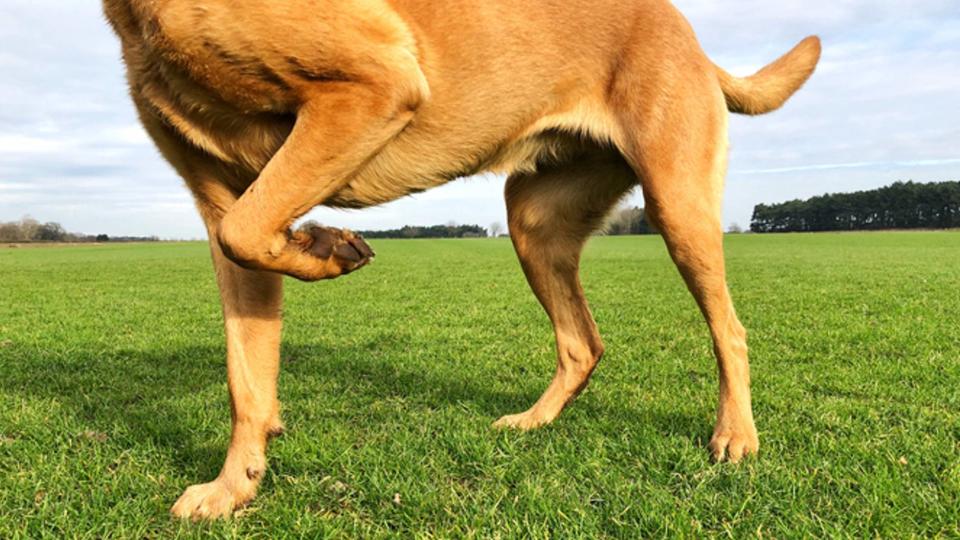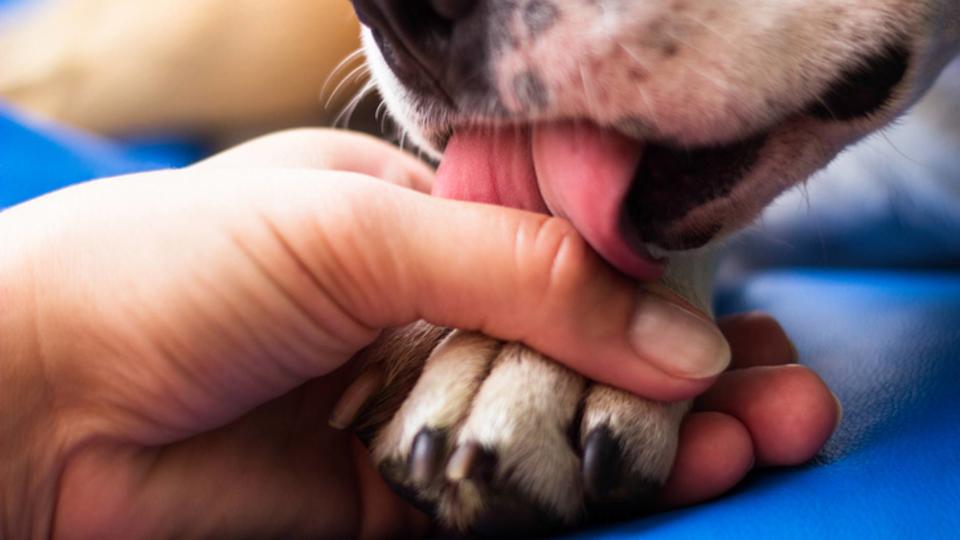Why do dogs lick their paws? 9 explanations and how to treat
When you buy through links on our articles, Future and its syndication partners may earn a commission.

Why do dogs lick their paws? There are lots of reasons why your fur friend might start doing this behavior, but it usually indicates an underlying issue.
If you’ve got one of the best dog grooming kits and keep their coat in tip-top condition, then you might be feeling a little bit confused. However, it can be caused by problems, like allergies, stress, and infections (which we’ll go into later).
You might have also noticed that your dog has inflamed skin, odor changes, a brown-pink tinge to their skin from saliva staining, or itchiness around their body.
To learn about the common reasons why dogs lick their paws, keep on reading. Our expert vet Dr. Rebecca MacMillan has listed all the possibilities below, plus treatment options they might need to have.
Why do dogs lick their paws?
There are several reasons why your dog might be licking at his paws. Here is a list of some of the most common causes:
Parasites
Parasites such as mites could cause itchiness and irritation to the skin on your dog’s paws. Harvest mites are seen in the fall months, targeting the paws and tummy. Other types of mites like Demodex and Sarcoptes could be contributing to the itchiness as well as other symptoms like hair loss and crusting of the skin. Here's how to treat a dog with worms.
Allergies
Allergies are a very common cause of excessive paw licking in animals. They can affect any dog but are often first seen in those aged between one and dive years. Some allergic dogs may have itchy paws only, whereas others are itchy all over their body.
Dogs can be allergic to an array of things in the environment like grass pollens, tree pollens, house dust mites, and flea bites. They can also be allergic to certain types of food, including everyday proteins like chicken, beef, or pork.
Want to learn how to help a dog with allergies? This vet's guide has the answers.
Damaged claws
If your dog has pulled or broken a nail then it may be sore, causing them to lick or nibble at the affected foot. Secondary infections could also occur in the nail bed creating further discomfort, as well as swelling and discharge.

Wounds
Cuts, burns, and penetrating injuries could all cause pain and make your dog lick. Small superficial wounds may heal quite quickly whereas others might require treatment, especially if infection occurs.
Arthritic pain
Dogs with joint pain may lick at their paws and legs to self-soothe and relieve the discomfort. With arthritis, you may notice other symptoms such as hobbling or limping, especially after your dog has been lying down. This feature has more information about joint pain in dogs.
Infections
Malassezia (yeast) infections often occur secondary to skin allergies in dogs or issues with the dog’s skin barrier. This can further aggravate the itchiness. Bacterial infections could also cause your dog to lick.

Foreign bodies
Foreign material embedded in your dog’s paw can encourage licking. The most common type of material seen in paws is grass seeds. These can get stuck between your dog’s toes and gradually migrate into the skin causing irritation and inflammation. Many foreign bodies require surgery to extract again.
Stress
Some dogs will lick their paws due to underlying behavioral issues such as stress. Repetitive actions can help some dogs feel better about their situation. Boredom and anxiety can also drive some dogs to lick excessively. You may notice other things too like excessive barking, panting, pacing as well as destructive behaviors like chewing. Here are 32 ways to destress your dog.
Self-grooming
Often, your dog licking their paws can be part of their grooming regime, and so isn’t usually a cause for concern unless your dog is licking excessively or you notice saliva staining in their fur.
Should I stop my dog from licking his paws?
You definitely shouldn’t actively encourage your dog to lick his feet, so try and distract him, perhaps by playing with him. It can be quite difficult to stop him from licking altogether though. The most effective way of getting him to stop is to treat the underlying problem. Using a buster or Elizabethan collar may help temporarily until you can seek help from a veterinarian, particularly if your dog is traumatizing his feet badly.
Your dog is trying to warn you that there is an underlying problem when they lick their paws, so take this seriously and get him checked out.
What remedies are there for red paws that have been excessively licked?
It is best to ask your vet for treatment rather than buying over-the-counter remedies. While some may be helpful in soothing irritated skin, they don’t usually treat the underlying cause. It is best to put your money into getting your dog examined properly.
Why do dogs lick their paws before bed?
Some dogs do this as a way of self-soothing and relaxing before they go to sleep. It can be part of their grooming regime, and so isn’t usually a cause for concern unless your dog is licking excessively or you notice saliva staining in their fur.

Why do dogs lick their paws after scratching their ears?
Some dogs will lick their paws after scratching at their ears because they are sniffing and analysing the odor. This is commonly seen in dogs that have ear infections, where there is an increase in odor and wax that can be transferred to your dog’s feet after scratching.
How to stop a dog from licking his paws
The best thing you can do is to take your dog to the vet. As discussed previously there are multiple reasons why your dog might be licking his feet and your vet will be able to help you work out which it might be.
Your vet will start by examining your dog, and this may be enough for them to find out the cause, particularly if there is a wound or broken nails. Sometimes samples are required such as hair plucks, skin scrapes, and swabs, to look for parasites, bacteria, and yeasts. If your vet suspects an underlying skin allergy they may discuss the next steps to investigate and treat this further.
The exact treatment your dog might require will depend on your vet’s findings but could include medicated washes, parasite treatments, antibiotics, or allergy medications. Your vet may recommend a behaviorist if they suspect your dog licks their paws when stressed or because of anxiety issues.
There are multiple reasons why dogs lick their paws, so it’s best to get him checked out by a vet promptly. The earlier the treatment is started the more effective it is likely to be. Your dog will be much more comfortable once the underlying cause is identified!
To learn more about excessive licking in dogs or signs a dog is in pain check out these vet guides.
